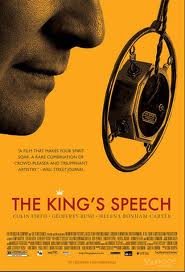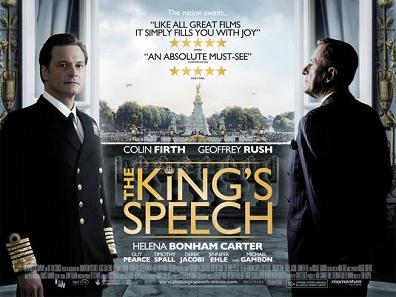A Spin on The King’s Speech
By Asher Crispe: February 25, 2011: Category Inspirations, Living with the Times
 As the delight of movie goers and critics alike, The King’s Speech has proven to be a charming motion picture. While some reviewers have called into question its historical accuracy (notably Christopher Hitchens), the film revolves around the ascension to the British throne of King George VI and the challenges he faced in this new role as a public figure encumbered with a speech impediment.
As the delight of movie goers and critics alike, The King’s Speech has proven to be a charming motion picture. While some reviewers have called into question its historical accuracy (notably Christopher Hitchens), the film revolves around the ascension to the British throne of King George VI and the challenges he faced in this new role as a public figure encumbered with a speech impediment.
Called upon to speak to the world via radio broadcast at the beginning of the Second World War, the new King receives the assistance of a rather untraditional speech therapist, Lionel Logue, whose friendship and instruction help him rise to the occasion and overcome the challenges of his stutter.
By exploring the essential link between leadership and communication—particularly in an age of new media—the film opens up a theme which is near and dear to the teachings of Jewish mysticism. Citing an expression from Ecclesiastes (8:4): “For the speech (devar) of the king has authority…”, the kabbalists point out the importance of this juxtaposition of communication with leadership. Devar melech might even be loosely translated as ‘the king’s speech.’ But this only asserts that they are closely associated.
In the locution of traditional kabbalistic texts, the dimension of reality known as malchut (kingdom) is considered to be a world of speech. One’s kingdom really means one’s domain of influence. As far as the word or decree of the king travels—that is the estimation of its capability to impact those who hear it. All kingdoms are ‘media’ kingdoms. So too, each person’s leadership potential is factored by self-expressive aptitude, a capacity for dissemination.
The Talmud (Tractate Sanhedrin) marks an even great intensification of this bond: “There is one leader (dabar) of the generation…”, Here the word for leader (dabar) is from the identical root of the word for word/speech (devar). This etymological connection effectively superimposes the concept of communication upon the idea of leadership. They are equivalent. A king who cannot communicate is not a king.
 Finally turning back to the history of ancient Israel, we can further empower this insight, by revealing the hidden meaning of the name of one of the most famous leaders of the Jewish people during an era prior to the establishment of a monarchy. Chronicled in the Book of Judges, the extraordinary figure of Devorah (Deborah) the prophetess personifies the ‘communicator as leader’ principle. While most understand the plain meaning of Devorah as “bee,” her name also contains the same root as debor (speech) and debar (leader). She is literally a living embodiment of the power relations bound up with speech.
Finally turning back to the history of ancient Israel, we can further empower this insight, by revealing the hidden meaning of the name of one of the most famous leaders of the Jewish people during an era prior to the establishment of a monarchy. Chronicled in the Book of Judges, the extraordinary figure of Devorah (Deborah) the prophetess personifies the ‘communicator as leader’ principle. While most understand the plain meaning of Devorah as “bee,” her name also contains the same root as debor (speech) and debar (leader). She is literally a living embodiment of the power relations bound up with speech.
Another noteworthy parallel between the film and the star cast of the Torah can be found in the summoning of Moshe (Moses) to public life. Charged with redeeming the Jewish people from slavery in Egypt, Moshe must prove himself as a leader at this time of national crisis. This task is a daunting one for him for reasons he makes clear in a desperate plea to God in Exodus (Shemot 4:10): “Please, my Lord, I am not an eloquent man, not since yesterday, nor since the day before yesterday, nor since You first spoke to Your servant, for I am heavy of speech (lit. mouth) and heavy of tongue.” From here, Rashi, the famed rabbinical commentator informs us that Moshe was a stutterer! For this greatest of all leaders, speaking came with difficulty.
Responding with encouragement as the speech therapist, God’s rejoinder to Moshe reframes the nature of the problem (4:11): “Who gave man a mouth? or who makes a person mute or deaf, or slighted or blind? Is it not I, G-d? So now, go! I shall be with your mouth, and teach you what to say.” In practice, this promise of Divinely inspired communication skills is coupled with the aid of Aharon (Aaron), Moshe’s brother who will also serve as the press secretary tasked with relating, reiterating and interpreting the prophetic messages in a manner in which they will be able to be received.
So much for the surface story. The real secret in all of this, according to Kabbalah, has to do with the extremely high root of the soul of Moshe. His perception of reality from such a lofty and expansive vantage point defies all conventional attempts to be expressed. Any true visionary, seeing a future that does not seem to be a possible natural outgrowth of the present reality of the people, presents unique communication problems. How does one convey the inexpressible? Without any experiential frame of reference, how can one relate a course of action to the people? Would not such a message be met with deaf ears?
Moshe knew that his task was to overcome the cognitive dissonance of the people. The stutter was literally referred to as the ‘heaviness’ of the month and tongue. The weight of the words broke the channels of everyday communication. Having something hard to say due to its extreme gravity, on account of its enormous significance, produces the disruption of the normal flow of speech. Stammering symbolizes the speaking of the language of the unsayable.
Spasmodic communication has come to define spiritual communication of the present day as well. The modes of discourse for earlier generations do not smoothly compute for the current one. The message is at best broken up and hard on the ear. Moreover, it is equally hard for the speaker, who properly belongs to a different world, to deliver. Yet, with the right coaching and adjustment to the new mediums of communication—more Facebook, Youtube and Twitter than Radio—we might find the confidence to stand in front of the world and emerge as the leaders we were intended to be.
 To lead implies an envisioned goal or direction. Imparting that vision actualizes a person’s potential for leadership. Somewhere between the vision and its acceptance in the ears, minds and hearts of the people, lies a gap which is filled by efforts at expression that must overcome an initial stuttering. Unimpeded speech belongs to the order of promises of a utopic future. We cannot remain tongue-tied and tight lipped nor should we trip over our words any longer.
To lead implies an envisioned goal or direction. Imparting that vision actualizes a person’s potential for leadership. Somewhere between the vision and its acceptance in the ears, minds and hearts of the people, lies a gap which is filled by efforts at expression that must overcome an initial stuttering. Unimpeded speech belongs to the order of promises of a utopic future. We cannot remain tongue-tied and tight lipped nor should we trip over our words any longer.














;)
;)
;)
;)
;)
;)
;)
;)
;)
;)
